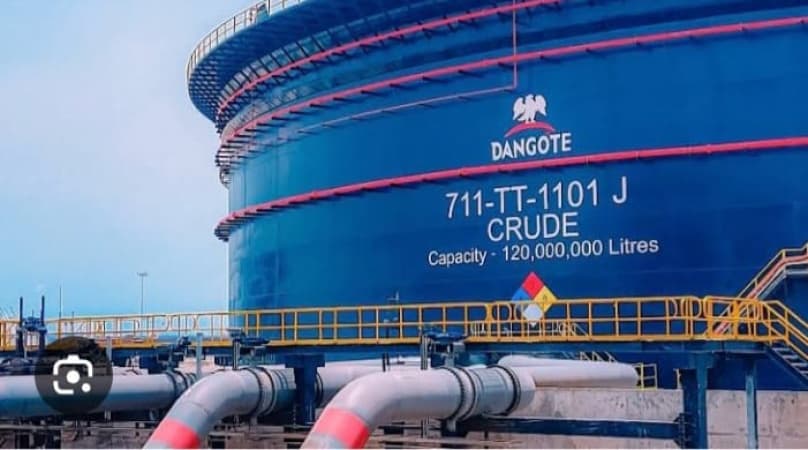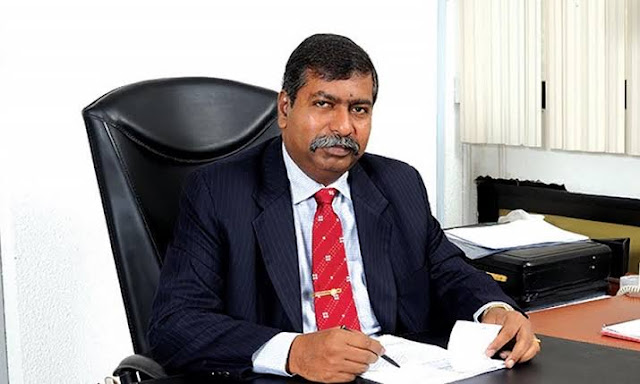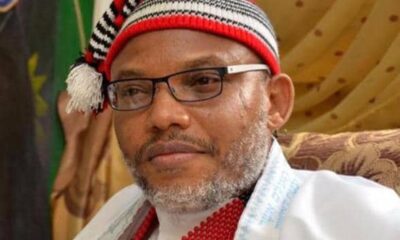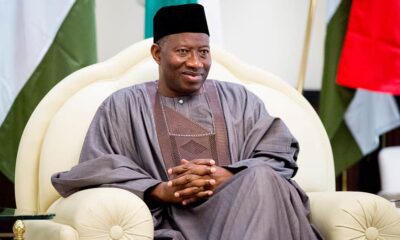
Business
Naira hits 10-month high on strong FX inflows

The naira extended its gains at the official market last week as it gained 0.72 per cent (or N10.5) to close at 1,455.17/$, the strongest it had been since December 2024, data from the Central Bank of Nigeria has revealed.
Analysts disclosed that the performance of the domestic currency was driven by robust foreign exchange inflows from portfolio investors and remittances.
At the parallel market, the naira strengthened 0.88 per cent to 1,475/$, also supported by improved liquidity.
The FX market had traded mixed through the week. It opened on a bearish note as early demand pressures caused by the exit of Foreign Portfolio Investors led to a dip. However, the market sentiments shifted midweek, buoyed by strong foreign inflows, particularly from FPIs sourcing naira to meet local fixed-income obligations.
AIICO Capital, in its outlook for the new week, said, “The naira is likely to remain stable in the near term, supported by improved US dollar supply and external reserves.”
Cowry Assets Management Limited, in a review of the FX market, said that it also noted that the local currency’s improvement was helped by better foreign exchange inflows, which reduced pressure on demand.

It maintained a positive outlook for the naira, saying, “We expect the naira to stay stable in the near term, supported by steady FX inflows and CBN interventions. However, rising import demand or weaker dollar inflows could slow further gains. Oil prices may remain under pressure due to higher supply, but any rebound in global demand could offer some support to Nigeria’s external earnings conditions, underpinning optimism for FX market stability; volatility in global oil markets may keep investor sentiment cautious.”
The external reserves also increased to $42.57bn, helped by higher inflows from oil sales, remittances, and portfolio investments. This steady rise in the external reserves gives the CBN more room to manage short-term pressures and supports expectations of naira stability in the near term.
In the past week, the naira got some cheery news that experts have said would further strengthen the liquidity in the market. The global index provider, FTSE Russell, in its September 2025 semi-annual country classification review for equities and fixed income, added Nigeria to the Watch List.
Explaining further, FTSE Russell said that the addition to the watchlist makes “possible reclassification from Unclassified to Frontier market status as the market meets the five FTSE Quality of Markets criteria required for attaining Frontier market status.”
Nigeria had been moved to the “Unclassified” category in September 2023 on the back of severe delays in foreign investors’ capital repatriation and FX transactions experienced by foreign investors as of that time.
However, recent policy reforms have improved FX liquidity, with market participants reporting no significant delays, prompting FTSE Russell’s decision. Now on the watchlist means Nigeria will be in a period of formal observation and engagement with market participants ahead of a potential upgrade in the next annual review cycle, expected in March 2026.
The analysts at Meristem Securities said, “This shift repositions Nigeria back on the investment radar for global funds that benchmark against the FTSE.
Frontier market index
Active funds will begin pre-positioning to capture the upside ahead of the formal re-entry, while passive funds will prepare for mandatory future allocations. This translates to potentially significant inflows of Foreign Portfolio Investment over the next year. In addition, this directly supports the Nigerian naira as anticipated capital inflows increase dollar supply, helping to sustain liquidity and stability in the FX market.
“In the short term, anticipation of fund flows is likely to fuel market optimism and price appreciation. However, long-term success depends on the Nigerian government’s commitment to sustaining a market-driven economy throughout this critical probationary period.” (PUNCH
Business
Dangote partners Honeywell International to expand refinery capacity

Dangote Group on Tuesday announced it has entered a strategic partnership with Honeywell International Inc to support the next phase of expansion of the Dangote Petroleum Refinery.
The company’s Group Chief Branding and Communications Officer, Anthony Chiejina, in a statement, said this collaboration will provide advanced technology and services that will enable the refinery to increase its processing capacity to 1.4 million barrels per day (bpd) by 2028.
This, according to him, marks a major milestone in their long-term vision to build the world’s largest petroleum refining complex.
Last month, the refinery announced plans to scale up its capacity to 1.4 million bpd from the current 650,000 bpd. The move will take the crude oil processing facility, Africa’s largest refinery and the world’s biggest single-train refinery, the largest in the world, past India’s Jamnagar Refinery, whose capacity stands at 1.2 million bpd.
Chiejina wrote: Dangote Group is pleased to announce that it has entered a strategic partnership with Honeywell International Inc to support the next phase of expansion of the Dangote Petroleum Refinery.
This collaboration will provide advanced technology and services that will enable the refinery to increase its processing capacity to 1.4 million barrels per day by 2028, marking a major milestone in our long-term vision to build the world’s largest petroleum refining complex.

Through this agreement, Honeywell will supply specialised catalysts, equipment, and process technologies that will allow the refinery to process a broader slate of crude grades efficiently and to further enhance product quality and operational reliability.
Honeywell, a global Fortune 100 industrial and technology company, offers a wide portfolio of solutions across aviation, automotive, industrial automation, and advanced materials. Honeywell’s division UOP has been a technology partner to Dangote since 2017, providing proprietary refining systems, catalyst regeneration equipment, high performance column trays, and heat exchanger technologies that support our best-in-class operations.
Dangote Group is also advancing its petrochemical footprint. As part of the wider collaboration, we are scaling our polypropylene capacity to 2.4 million metric tons annually using Honeywell’s Oleflex technology. Polypropylene is a key industrial material widely used across packaging, manufacturing, and automotive applications.
In addition to refining expansion, Dangote Group is progressing with the next phase of its fertiliser growth plan in Nigeria. We will increase our urea production capacity from 3 million metric tons to 9 million metric tons annually. The existing plant consists of two trains of 1.5 million metric tons each. The expansion will add four additional trains to meet growing demand for high-quality fertiliser across Africa and global markets.
Dangote Group remains fully committed to delivering world-class industrial capacity, strengthening Nigeria’s energy security, and driving sustainable economic growth through long-term investment, innovation, and strategic global partnerships.
Business
EERC warns MainPower against illegal creation of New Accounts without meters

The Enugu State Electricity Regulatory Commission (EERC) has issued a strong warning to MainPower Electricity Distribution Limited over reports of the indiscriminate creation of new customer accounts without the provision of meters ,a move the Commission described as a direct violation of its regulatory framework.
According to a statement from the Commission, multiple complaints have been received from customers alleging that MainPower has been creating new accounts in the names of existing customers without supplying dedicated meters, effectively subjecting them to additional estimated bills.
Citing Section 35(1)(f) of the Enugu State Electricity Law 2023 and key provisions of its Customer Service Standard and Protection Regulations (CSSPR) 2024, the Commission reaffirmed that every new connection must include a properly installed meter and accessories as specified in the Metering Code.
“The process of connection shall comprise the connection of residences or premises to public supply and the installation of a meter and associated accessories,” the regulation states, emphasizing that the materials and meters required for such connections are the sole responsibility of the Service Provider.
The Commission has formally notified MainPower to cease the creation of new accounts under existing customer names without metering.
It also urged affected customers to report any such infractions via email at info@eerc.en.gov.ng or by phone on 09122642755 for enforcement action.

In addition, the EERC encouraged unmetered customers and new subscribers to take advantage of the Meter Asset Provider (MAP) Scheme, which allows customers to fund their meters upfront with guaranteed refunds under Commission-approved terms.
“Any new account created without a corresponding meter is in violation of regulatory provisions,” the statement concluded.
Business
Dangote Refinery, a strategic national asset – Devakumar Edwin

• We’ve 150 days PMS stock
• We used Indigenous technical know-how to build this refinery, he reveals
The Vice-President, Dangote Refinery Limited, Mr. Devakumar Edwin has classified the refinery as strategic national asset for the country.
Mr. Edwin who made the statement during a tour of the oil facility located at the Lekki Free Trade Zone in Lagos, by editors of several media organizations across Nigeria, added that it has a strategic reserve of 150 days Premium Motor Spirit (PMS) stock.
He noted that aside being the second largest employer of labour in Nigeria after the government, the company has created indigenous petroleum engineers, contributes immensely to the Gross Domestic Product (GDP) and gradually transforming Nigeria into the leading global player in the oil services sector.
He explained that with the innovative ideas of Aliko Dangote, President of the Dangote Group, who does not believe that “anything is impossible,” they have created not just the largest refinery in the country, but a key player in the production of fertilizer across the world.
Edwin said: “We have here at the Refinery, 150 days national stock of Premium Motor Spirit (PMS). In case of diesel (AGO), we have more than 150 days stock, for Aviation fuel, we have much more. So what we have in this facility is a strategic national reserve.
“Before we set up this largest single train, the global petroleum refinery has 430,000 barrels per day in the Middle East. But, what we set up here is 50% larger than the hitherto largest refinery.
“In fact, the biggest thing we are more proud of is that a Nigerian company built it. If you go all across the world, to US, to Europe, to Asia, their refineries were built by Shell or Chevron or Exxon Mobil or Total, Bechtel from US, Siphon from Italy, Technip from France, JGC from Japan, Chiyoda, these six companies are the ones who have practically built all the refineries in the world.

“But when it came to our company, we went and talked to the three of them, they all said, okay, you are talking about 650,000 barrels. The capital cost will be roughly $30,000 a barrel, which means 30,000 into 650,000 is about 19 and a half billion dollars.
“So it’s 20 billion dollar investment. You will need to pay us 15% fees, which is $3 billion. And so my President said, no, let’s go and build it ourselves. We told him, you see companies like ExxonMobil, Shell, Total, Chevron they have never tried it. And you want us to do this? It’s almost impossible.
“Then he said, Edwin, have you forgotten? You know he has a plaque on his table which says ‘nothing is impossible’. Have you forgotten what I keep on my table? So he said, nothing is impossible. Let’s just go and do it.
“And that is how we built this refinery. Dangote Projects limited built this refinery. Nigerians can be proud of that.
“A Nigerian company attempted and built the world’s largest single train refinery. And now we can see the value addition which is creating in.
“The Dangote Refinery has become a game changer for Nigeria and its economy. The refinery has helpped stabilized the nation’s economy.
“You can see we are exporting our jet fuel primarily to Europe. Our gasoline has gone to us, our diesel is going to Europe. So it’s not only consistent supply of fuel but also high quality fuel.
“And then if you see the prices of fuel last year after the subsidy was removed, it was going up, stabilized at a level.
“You can go and check at what price it was selling and at what price it is selling today. I have been in Nigeria for 34 years. I have not seen even the price of stationary paper or a pure water coming down.
“And we have seen for the first-time fuel prices coming down. So we have not added value only in terms of quality and consistency of supply, but in terms of pricing.
“And, you can see the global impact of the price of the refinery. You can see how the currency values have been stable or sometimes even becoming stronger because instead of importing huge quantities of finished petroleum products, now you are having locally available products and we are also exporting products. So, we are also generating foreign, foreign exchange. So there is a net benefit to the country.
“This is a huge forex outflow. Now there is inflow and also outflow is reduced. In fact, if we continue to go in this direction strongly, the currency will even continue to become better. So, the refinery has been able to contribute in a large way”.
Aside being in oil and gas, the factory also has constructed a huge 300 million metric tonnes per annum Urea (fertilizer) plant and is currently developing additional 600 million metric tonnes plant beside the existing plant envisaging that nobody will feed feed Nigeria in due course in spite of population growth.
“What this means,” he said, “is that more Nigerians can go into commercial farming with available fertilizer at affordable price.
Equally speaking while taking the editors round the project site l, Engr. Osunsakin Adelani, a pioneer engineer at the plant, said the current gantry at Dangote Refinery can load 707 trucks of PMS within an hour.
“We have global best laboratories where everything we do here, at every stage of the production, are first tested for quality control before the completion of production. And we have the capacity to monitor every single live feed from every point in the refinery”.
He also said that the refinery is standing on 75 per cent swamp.l, of which 65 million cubic meters of sand was pumped from the Atlantic Ocean to reclaim the land to natural settlement.
“We did surveys which made us drive 250,000 pauch and colon of 62 meters, importing crude oil from Nigeria, US, Angola, and other countries that have the type of crude we require,’ and these is because, Nigeria is not producing enough crude to satisfy the refinery’s need.
To overcome the high cost of constructing the refinery from the so-called global best refinery construction engineering firms, “we set up a construction company to construct the roads here and to construct the refinery,” he added.
-

 News2 days ago
News2 days agoBREAKING: FG bans open cattle grazing nationwide
-

 News2 days ago
News2 days agoBandits abduct 18 persons in fresh attacks on Kano villages
-

 News3 days ago
News3 days agoBandits claim Kebbi, Niger abductions, threaten more attacks on soldiers, politicians
-

 News3 days ago
News3 days agoSouth-East Reps urge Tinubu to pardon Nnamdi Kanu
-

 News2 days ago
News2 days agoTinubu orders total security cordon on Kwara forests, says aide
-

 News21 hours ago
News21 hours agoEx-Nigerian President Jonathan trapped in Guinea Bissau after coup
-

 News1 day ago
News1 day agoBREAKING: President arrested as soldiers take over power in Guinea-Bissau
-

 News2 days ago
News2 days agoBREAKING: 25 abducted Kebbi schoolgirls regain freedom



















